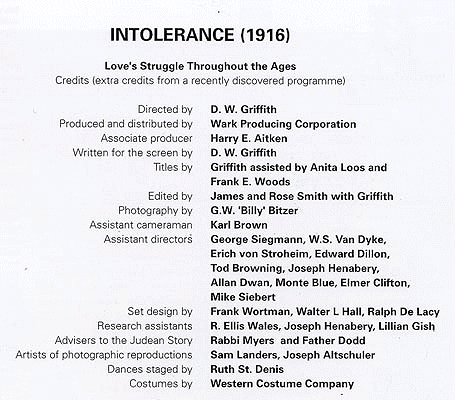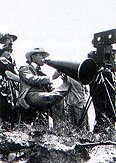
The first historical block-buster, this is one of the most famous and influential films in the history of early cinema. It is about three hours long (with interval) and the megalomanic director, who is said to have believed he was God and behaved as such, manipulated his cast of thousands on a gigantic set built next to a block of bungalows in Hollywood, with incredible accomplishment. In a pre-show talk, we were urged not to titter at the over-acting, especially Griffiths' predeliction for making his young women stars 'jump around like chickens'!

It has to be whispered that there were longeurs and
Intolerance's story line does not fully support D. W. Griffiths'
[left] declared humanitarian
aims, seen most of a century on. We were deliberately being titillated by
scenes of sex, violence and cruelty which we were meant to find repugnant.
The four stories, linked by common themes, but set in different ages, are
cut from one to another (an innovative method) as we progressed in parallel
to the Crucifixion, the Massacre of the Huguenots, the Fall of Babylon and
a modern rescue from the hangman's noose of a falsely convicted murderer
in the nick of time after a race between a coach and an express train, the
whole tied up with a sentimental finish and montage of flowers and smiling
children.
More seriously, having now seen a number of silent films with the LPO playing specially composed or assembled scores by Carl Davis, his method begins to pall. The material is undistinguished and extremely repetitive, in a generalised, sub-19th C/Early 20th standard tonal idiom, which fleetingly brings to mind top classical composers, spiced with popular or slightly 'ethnic' music for contrast as appropriate. Keeping pace with the cutting from story to story, the musical joins too were often jerky.
However, success should not be disparaged. The skilful orchestration of this huge score by the Matthews brothers reminds us how few composers can make a living with their concert music alone, and the whole exercise succeeds in providing lucrative employment for large orchestras internationally and in attracting and pleasing capacity audiences, amongst which I have counted myself on several occasions, e.g.Chaplin's The Gold Rush.
One of my most memorable film+music experiences was long ago in an early South Bank summer festival, when composer George Benjamin improvised at the piano a spellbinding accompaniment to a silent classic film. Having got such a winning formula, is it not time for Mr Davis to consider taking a back seat and commissioning scores from composers who might bring a contemporary idiom into these evenings, linking the early 20th to the early 21st centuries? Ballet audiences respond to contemporary music which can turn away concert audiences; aficionados for silent film might well do so too.
The next Silver Screen Classic in the LPO's series is Buster Keaton's 'ultimate chase movie' The General at RFH on 30 September.
Peter Grahame Woolf
 Return to:
Return to: